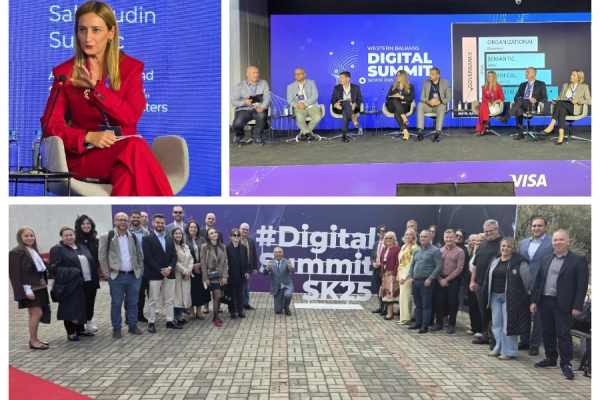
From Connected Systems to Connected Citizens: ReSPA’s Panel, Co-organized with GIZ, on Interoperability at the WB Digital Summit 2025
1–2 October 2025, Skopje, North Macedonia
The Western Balkans Digital Summit 2025 gathered ministers, international partners, private sector leaders, and digital experts, reaffirming the region’s shared commitment to a connected digital future.
The two-day summit, hosted by the Ministry of Digital Transformation of North Macedonia, was opened by Prime Minister Hristijan Mickoski, followed by Stefan Andonovski, Minister of the North Macedonian Ministry of Digital Transformation, Amer Kapetanović, Secretary General, Regional Cooperation Council (RCC), Renate Nikolay, Deputy Director for Communications Networks, Content and Technology EC, Thomas Lamanauskas, Deputy Secretary General, International Telecommunication Union (ITU), Thomas Jaryombek, Parlamentary State Secretary, German Federal Ministry for Digitalization and Government Modernization, Svyatoslav Senyuta, Government Solutions Regional Leader, VISA and Gordana Klincharova, State Secretary from the Ministry of Digital Transformation.
Across plenary and side sessions, the Summit featured nine major panels, bringing together dozens of experts to discuss pressing digital transformation topics:
- European Digital Hubs – advancing SME innovation and competitiveness.
- Digital Skills – preparing a future-ready workforce through education and inclusion.
- Research and Innovations – the role of NRENs in fostering talent and cybersecurity.
- Digital Wallets – secure and efficient solutions for public services.
- Interoperability – building citizen-centric, cross-border digital systems (ReSPA/GIZ panels).
- Cyber Security – a regional approach to resilience and EU convergence.
- AI and Government – scaling AI adoption in public administration responsibly.
- Connectivity (5G & fibre) – digital infrastructure as the backbone of growth.
- Businesses in the EU Digital Single Market – aligning WB6 with EU standards.
- Cybersecurity Solutions – leveraging private sector innovation to protect critical infrastructure
High-level contributions came from government ministers across the WB6, experts from the World Bank, GIZ, CEFTA, UNDP, GEANT, UNESCO, SAP, EBRD, as well as leading companies such as Makedonski Telekom, VISA, Adobe, Deutsche Telekom, Fortinet, Oracle, and Tech5.
ReSPA enriched the Summit by hosting the Panel on Interoperability, bringing together over 40 participants from 10 public administrations across the Western Balkans and Eastern Partnership. The session offered a unique opportunity to gain first-hand insights into the latest developments of the WB Digital Transformation agenda, while fostering connections, peer learning, and regional growth.
ReSPA panel “From Connected Systems to Connected Citizens”. The discussion highlighted interoperability as the backbone of a digital society, where public administrations, businesses, and citizens can connect seamlessly across borders.
Moderated by Üllar Jaaksoo (Partner at Digital Nation), the panel combined structured interventions, debate, and Q&A. Opening the session, Jaaksoo framed interoperability through the European Interoperability Framework’s four layers—legal, organisational, semantic, and technical—stressing that progress on all layers is crucial for efficient, people-centred digital transformation.
The panel tackled key questions:
- What are the risks if interoperability is not fully achieved?
- How to balance speed in digitalisation?
- How to manage the complexity of interoperability and data protection?
- What should be the top priorities in interoperability for the Western Balkans in the next 3–5 years
Each panellist shared insights and national or regional milestones:
Regional cooperation and capacity-building are the real accelerators of interoperability reforms. At ReSPA, we serve as a bridge, connecting administrations, fostering peer learning, and ensuring that knowledge flows across borders so that digital transformation truly benefits every citizen in the enlargement countries. This year, we were privileged to welcome civil servants from 10 administrations across the Western Balkans and Eastern Partnership at our Seasonal School on Digital Transformation, who continued their journey by engaging in this important Summit. Events like this, where regions connect and experiences are shared, are essential for driving progress and building a common digital future.” underlined Director Handjiska Trendafilova at the panel.
Goce Armenski, EU4Digital project – brought lessons from the EU and Eastern Partnership, highlighting best practices to transfer and pitfalls to avoid.
Nevila Repishti, Agency of Information Society (NAIS), Albania – showcased how interoperability already improves delivery of e-services to citizens and businesses.
Maja Dragojević, Ministry of Public Administration, Montenegro – underlined how interoperability enhances efficiency and transparency, citing successful building blocks in Montenegro’s digital transformation.
Sabahudin Suljević, Public Administration Reform Coordination Office, Bosnia and Herzegovina – reflected on the challenges of multi-level governance in BiH and how trust and coordination are vital to both national and cross-border interoperability.
Aleksandar Milinković, Assistant Director, Office for IT, Serbia – focused on the architecture of interoperability infrastructure, noting challenges and principles for sustainable solutions.
Goran Marković, CEO, Makedonski Telekom – offered a private sector view, stressing that telecom and tech providers are key partners in strengthening frameworks and creating win-win collaboration.
The session moved from introductory statements to a lively moderated exchange, touching upon lessons learned, funding challenges, and the need for common standards. An audience Q&A followed, bringing practical questions from practitioners and industry representatives.



